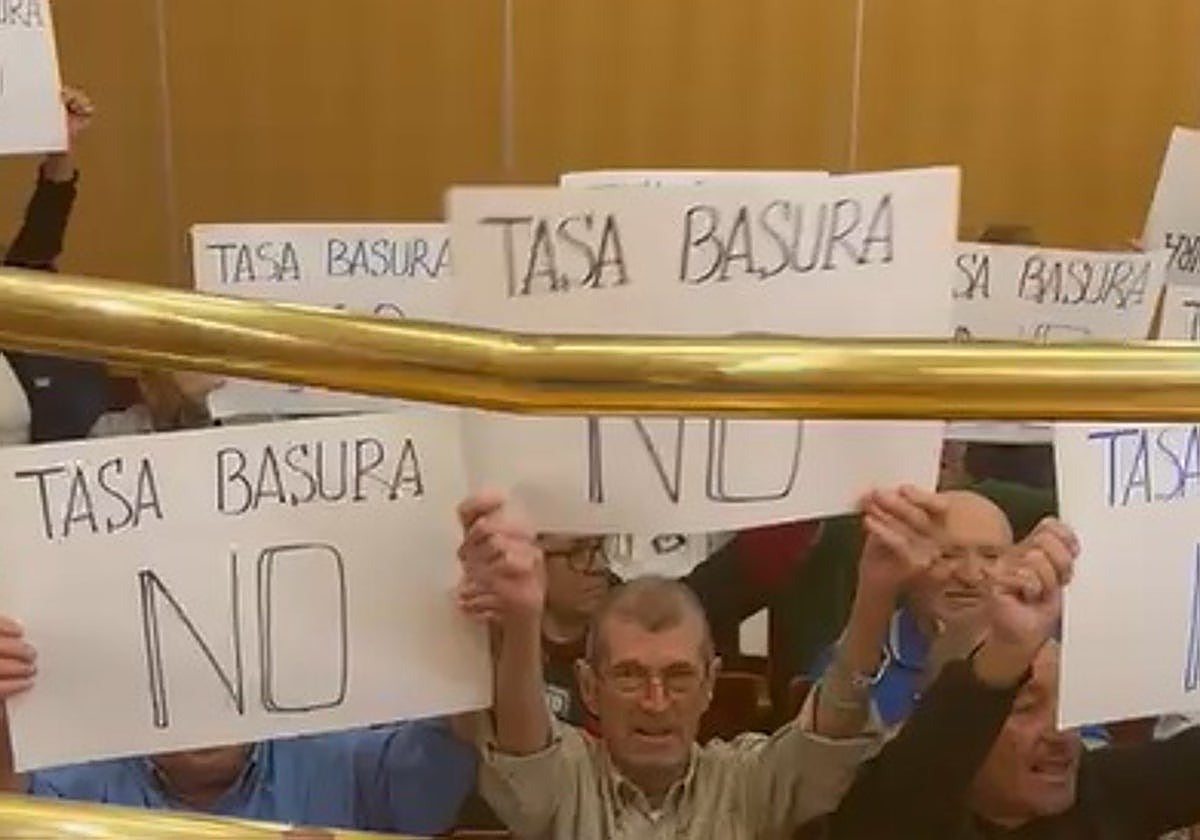Eugenio Cabezas
Vélez-Málaga
Monday, 3 November 2025, 10:43
Vélez-Málaga town hall on the eastern Costa del Sol has approved the reintroduction of a rubbish collection tax despite protests from local residents. From 1 January 2026, the nearly 86,000 inhabitants of Vélez-Málaga will be charged the new tax, which hasn’t been paid in the town, known as the ‘capital of the Axarquía’, since the early 1990s, when, following a political agreement the municipal tax was absorbed into the annual IBI municipal property tax.
Now, “imposed by Pedro Sánchez’s government” according to the town hall, in application of a European directive and a 2022 waste law, it will once again be payable in Vélez-Málaga from January 2026.
The vote went through during a council meeting on Friday 31 October, in the presence of around 300 local residents, of whom fifty sat in on the meeting, with the rest waiting outside with banners and placards opposing the new tax. Opposition parties Andalucía por Sí, PSOE, Vox and the independent councillor, Elías García, voted against the introduction of the tax, through which Vélez-Málaga town hall expects to raise almost 7.2 million euros per year.
Mayor of Vélez, Jesús Lupiáñez (PP), threatened on several occasions to remove the residents who were protesting inside the town hall building, but in the end Local Police did not intervene and the residents left the room when the vote on the item was over. The debate focused on the demand that, to compensate for the new tax, the IBI (property tax) should be reduced by the same proportion, so that there would be no “double taxation”.
Councillors argued that the town hall is immersed in an adjustment plan until 2040, due to delays in payments to suppliers, so in order to lower the IBI, they must have prior authorisation from the Ministry of Finance. “It’s double taxation. Why haven’t lowered the IBI? Because they didn’t feel like it. In 2027, they’re going to pay for what they’re doing here at the polls,” said PSOE spokesperson Víctor González, referring to the next local elections.
Reduced IBI
“They could have lowered it and they didn’t,” said Elías García. “It is one of the darkest episodes in the history of Vélez-Málaga and it will be the one that marks your term of office,” said Vox spokesperson Javier Herreros, addressing councillors in the meeting. The spokesperson for Andalucía por Sí, José Pino, accused the mayor of “wanting to collect more to pay for the whims of Atencia [the deputy mayor of Torre del Mar] to give him planes [the town’s annual international air show) ]and all the festivals,” he said.
The councillor for beaches, David Vilches, denied that the rubbish collection tax is charged in the IBI and criticised the opposition for not supporting “the IBI reductions approved in 2022, 2023 and 2024”. The councillor for finance, Manuel Gutiérrez (PP), also said that rubbish collection is not included in the IBI, that he was “wrong” when he said the opposite a few months ago and that the new rubbish tax “is being imposed on us”.
The mayor said before the vote, “It is not at all pleasant for me to have to approve a waste tax that is being imposed on us by the Spanish government and which the Popular Party is totally against. But we are responsible for enforcing the law and we have no choice but to apply it. However, I do want to announce that we have asked the Ministry for a rebate on the IBI tax rate.”
The new tax will be levied on both homes and businesses, ranging from 101 to 135 euros, with an average cost of 112.3 euros. The estimated cost of the urban solid waste collection and treatment service amounts to just under 7.2 million euros per year, according to the documentation definitively approved on Friday. Of this amount, 72.59 per cent will be passed on to the 48,494 registered residential properties in Vélez-Málaga, while the remaining 27.41 per cent will be paid by 10,216 businesses. A total of 126,000 euros in subsidies have been set aside for low-income families.
Each home will have a fixed tax of 62.66 euros per year, while the variable part will be calculated based on the cadastral value of the property, the surface area and environmental efficiency, distributed as 45%, 45% and 10%, respectively. Thus, the price range for the new tax will be between 101.86 and 135.54 euros per household every twelve months. In the case of industrial waste, it will have an average cost of 112.3 euros per year, while the variable part will be calculated based on the 13 economic categories and the surface area of the establishments in square metres.
However, despite this final approval, the opposition groups are not giving up on their attempt to stop this new tax, as they insist that in Vélez-Málaga, waste is paid for in the IBI “due to a political agreement dating back to the early 1990s”. The spokesperson for the Vélez-Málaga socialist group has announced that they will take the matter to court, filing an administrative appeal.
